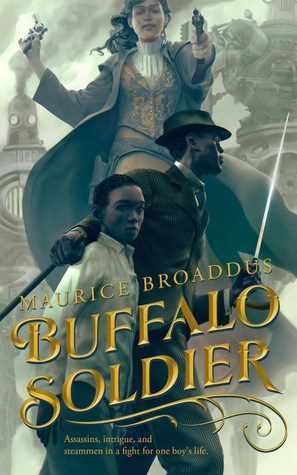 Buffalo Soldier by Maurice Broaddus
Buffalo Soldier by Maurice Broaddus Format: ebook
Source: purchased from Amazon
Formats available: paperback, ebook
Genres: alternate history, steampunk
Pages: 144
Published by Tordotcom on April 25, 2017
Purchasing Info: Author's Website, Publisher's Website, Amazon, Barnes & Noble, Kobo, Bookshop.org, Better World Books
Goodreads
Having stumbled onto a plot within his homeland of Jamaica, former espionage agent, Desmond Coke, finds himself caught between warring religious and political factions, all vying for control of a mysterious boy named Lij Tafari.
Wanting the boy to have a chance to live a free life, Desmond assumes responsibility for him and they flee. But a dogged enemy agent remains ever on their heels, desperate to obtain the secrets held within Lij for her employer alone.
Assassins, intrigue, and steammen stand between Desmond and Lij as they search for a place to call home in a North America that could have been.
My Review:
As yesterday’s book was a fictionalized story of a world that was, then today’s is a leap into world that might have been.
A leap somewhat like being dropped into a roller coaster just as its about to crest that first big hill and then a wild, screaming ride all the way to the end of the ride. Only to discover that, while the ride may be over, the story is just beginning.
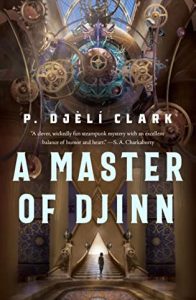 Although the historical turning points that created the steampunk-fueled world of Buffalo Soldier are different, in some ways the feel of the story is similar to Cherie Priest’s Clockwork Century that begins with Boneshaker. As well as, come to think of it, A Master of Djinn by P. Djèlí Clark as all three take the world down different legs of the trousers of time, and yet some forces of history seem immutable in the face of huge changes of circumstances.
Although the historical turning points that created the steampunk-fueled world of Buffalo Soldier are different, in some ways the feel of the story is similar to Cherie Priest’s Clockwork Century that begins with Boneshaker. As well as, come to think of it, A Master of Djinn by P. Djèlí Clark as all three take the world down different legs of the trousers of time, and yet some forces of history seem immutable in the face of huge changes of circumstances.
The United States, well, isn’t. Not that the manifest destiny ambitions of “Albion”, the English colony that encompasses at least the East Coast and Midwest, aren’t entirely too similar. But Albion hasn’t succeeded by this point in this world’s late 19th or early 20th century.
So this story opens in independent Tejas, caught between Albion on one side and the Five Civilized Tribes on the other, as Jamaican fugitive Desmond Coke finds himself and the boy he’s guarding caught in the crosshairs between the Pinkertons, the agents of Albion, and the agents of his own truly pissed-off government as he attempts to cross the contested border.
Everyone is out to get him. Actually, only his own government really wants him all that badly. But everyone wants the boy he calls Lij. Because Lij is entirely too many things to entirely too many people.
A symbol. An experiment. An abomination. A resource. Even all of the above.
But Desmond just sees him as a little boy who deserves the chance to BE a little boy and determine his own path when he grows up. If Desmond can keep them both alive and on the run long enough to have that chance.
Unless he can find them a sanctuary. Or he dies trying.
Escape Rating A: This is one of those stories where the reader is dropped into the midst of a world that has already been fully created. We just don’t know exactly what that world is, so it comes into focus through the characters, particularly the point-of-view character Desmond Coke.
We’re not in his head, but the action follows his perspective, so we’re not omniscient. We see what he sees and know what he knows. And he knows a lot about the world in which he lives as once upon a time he was an espionage agent for his home country of Jamaica.
At least until he scooped up Lij and ran away into the predicament in which we find him as the story opens.
While the hints of how his world differs from ours and how it got that way are absolutely fascinating – at least to this reader – what kept me turning the pages was the quick, sharp peeks into his out of the frying pan into the fire journey. He’s desperate, he didn’t plan things out nearly as well as he should have, and no plan survives contact with the enemy.
Or, in this case, no plan survives contact with situations where there are enemies on every side with their weapons pointing at each other while Desmond is caught in the crossfire. Sometimes literally.
The story is a thrill-a-minute ride as every time Desmond tries to take them a little further away, he just ends up in a bigger mess, his steps dogged at every turn by agents from pretty much every power involved in North America. Some are hunting him down, some are using him as bait to hunt each other down, and some are using him as a distraction while they go after their real goals.
And in the middle, there’s a little boy who deserves the chance to grow up and become his own man instead of just the sum of all the things he was created to be. The truth of which is revealed over the course of the story and manages to catch at both the heart and the throat at the same time.
So, come to this one for the wild ride. Shake your head in rueful recognition at the ways that the powers-that-be are exactly the same as they are even in an entirely new world. Stay for the story, and the stories about stories, at its heart.
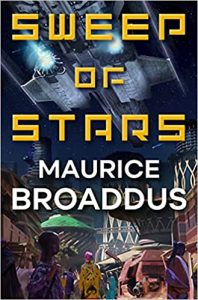 Whatever brings you on this steampunk journey, I believe you’ll find it well worth the trip.
Whatever brings you on this steampunk journey, I believe you’ll find it well worth the trip.
Initially, I picked this up because I needed a couple of really short books this week and this looked like fun. Which it was! So I’m really glad I read it because it made for a terrific reading pick-me-up. It also made me look and see what else the author has available and now Sweep of Stars has moved considerably up the virtually towering TBR pile. There are so many books, and so little time, but now that I’ve read something of his work I can’t wait to dive into his latest!

 A Prayer for the Crown-Shy (Monk & Robot, #2) by
A Prayer for the Crown-Shy (Monk & Robot, #2) by  Crown shyness is a real-world phenomenon. About trees. Which is totally fitting for this story that features two people – even though one of them doesn’t refer to itself as “people” – who are exploring both friendship and all the myriad wonders of their world together.
Crown shyness is a real-world phenomenon. About trees. Which is totally fitting for this story that features two people – even though one of them doesn’t refer to itself as “people” – who are exploring both friendship and all the myriad wonders of their world together. Escape Rating A: If you’re looking for a story that will shed some light into the darkness, just as those crown-shy trees let light through to the forest floor, read
Escape Rating A: If you’re looking for a story that will shed some light into the darkness, just as those crown-shy trees let light through to the forest floor, read 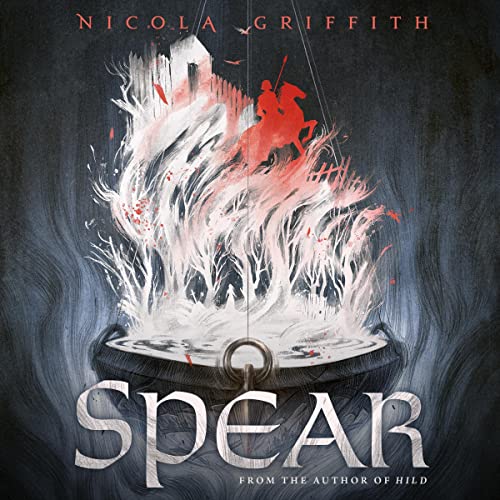 Spear by
Spear by  Spear turned out to be a lovely, lyrical, magical extension of the Arthurian legends that borrows rightfully and righteously, as all Arthurian tales do, from what has come before, from what fantasy writers have added to the period and the interpretation, from the time in which it is set, the time in which it is written, and the author’s magical stirring of that pot into a heady brew.
Spear turned out to be a lovely, lyrical, magical extension of the Arthurian legends that borrows rightfully and righteously, as all Arthurian tales do, from what has come before, from what fantasy writers have added to the period and the interpretation, from the time in which it is set, the time in which it is written, and the author’s magical stirring of that pot into a heady brew.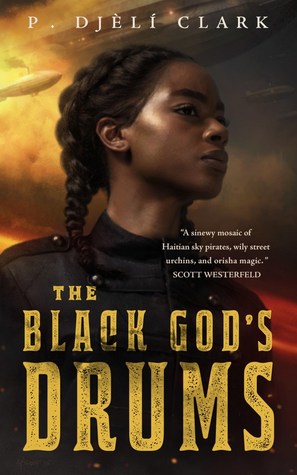 The Black God's Drums by
The Black God's Drums by 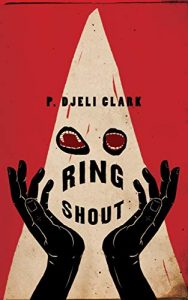 Right alongside the coming-of-age story of Creeper, a girl on the cusp of adulthood (Creeper’s OK with creeping up to adulthood, but she’s much less sanguine about approaching womanhood in any way, shape, or form) who wants more than anything to find a way out of the city she has lived in all of her life. She thinks her accidental discovery of a plot to drown the city in magically created storms can be traded for a berth on a smuggler’s airship.
Right alongside the coming-of-age story of Creeper, a girl on the cusp of adulthood (Creeper’s OK with creeping up to adulthood, but she’s much less sanguine about approaching womanhood in any way, shape, or form) who wants more than anything to find a way out of the city she has lived in all of her life. She thinks her accidental discovery of a plot to drown the city in magically created storms can be traded for a berth on a smuggler’s airship.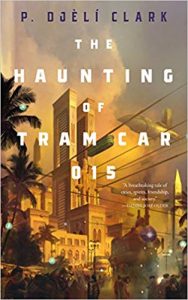 And on top of all that, we have not just the coming-of-age story, but a pulse-pounding adventure with deadly danger both in the immediate term and in the consequences if things go wrong. As they very nearly do. Along with the possibility of a daring rescue by pirate airship – or an ignominious crash of defeat.
And on top of all that, we have not just the coming-of-age story, but a pulse-pounding adventure with deadly danger both in the immediate term and in the consequences if things go wrong. As they very nearly do. Along with the possibility of a daring rescue by pirate airship – or an ignominious crash of defeat.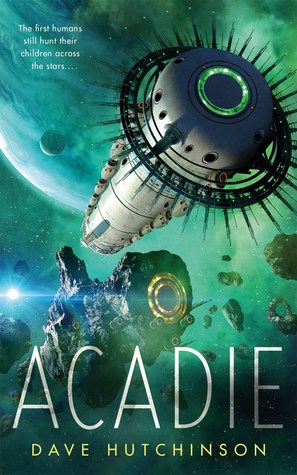 Acadie by
Acadie by 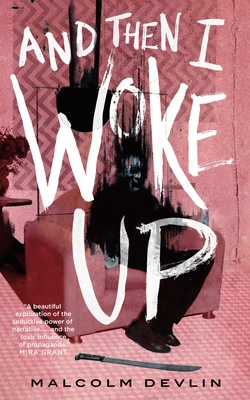 And Then I Woke Up by
And Then I Woke Up by 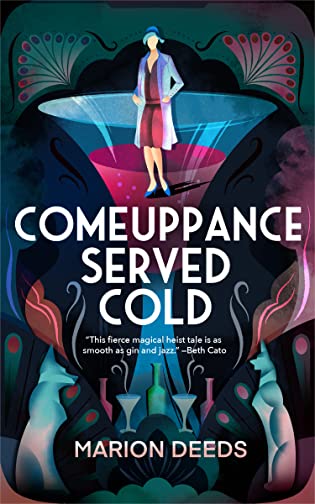 Comeuppance Served Cold by
Comeuppance Served Cold by 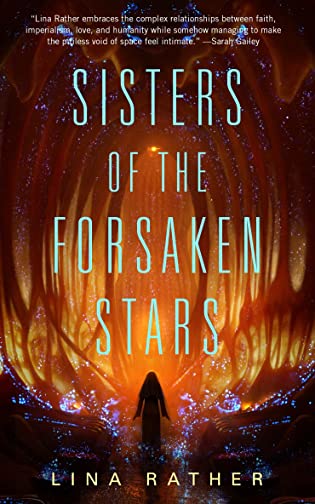 Sisters of the Forsaken Stars (Our Lady of Endless Worlds #2) by
Sisters of the Forsaken Stars (Our Lady of Endless Worlds #2) by 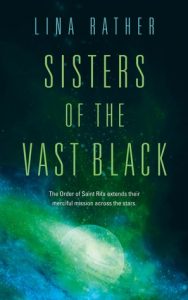 Escape Rating A-: What is making this series so special is a bit more in the implications than in what is actually on the page, which may not quite make sense but nevertheless feels true. On the surface, this is still OMG nuns in space, but not done for laughs any more than last year’s
Escape Rating A-: What is making this series so special is a bit more in the implications than in what is actually on the page, which may not quite make sense but nevertheless feels true. On the surface, this is still OMG nuns in space, but not done for laughs any more than last year’s 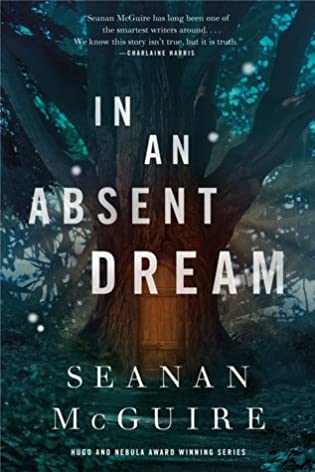 In an Absent Dream (Wayward Children, #4) by
In an Absent Dream (Wayward Children, #4) by  Escape Rating B+: Everything I picked up this week struck me wrong in one way or another. Sometimes very wrong as
Escape Rating B+: Everything I picked up this week struck me wrong in one way or another. Sometimes very wrong as 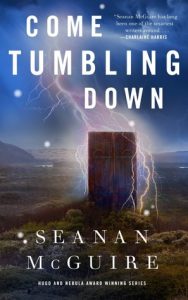 This series is special and awesome in a way that’s hard to describe. It’s as though the dreams of all of us who were bookish misfits as children dreamed all our dreams only to see those dreams come true in the form of nightmares. Some gifts come at just too high a price – and sometimes we’re desperate enough to pay that price anyway.
This series is special and awesome in a way that’s hard to describe. It’s as though the dreams of all of us who were bookish misfits as children dreamed all our dreams only to see those dreams come true in the form of nightmares. Some gifts come at just too high a price – and sometimes we’re desperate enough to pay that price anyway.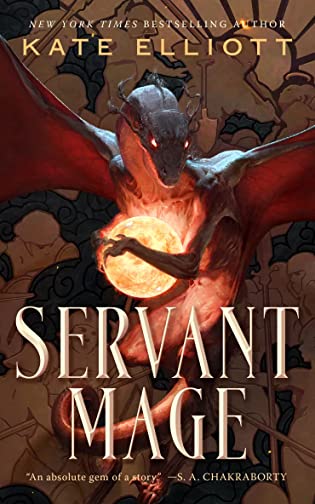 Servant Mage by
Servant Mage by